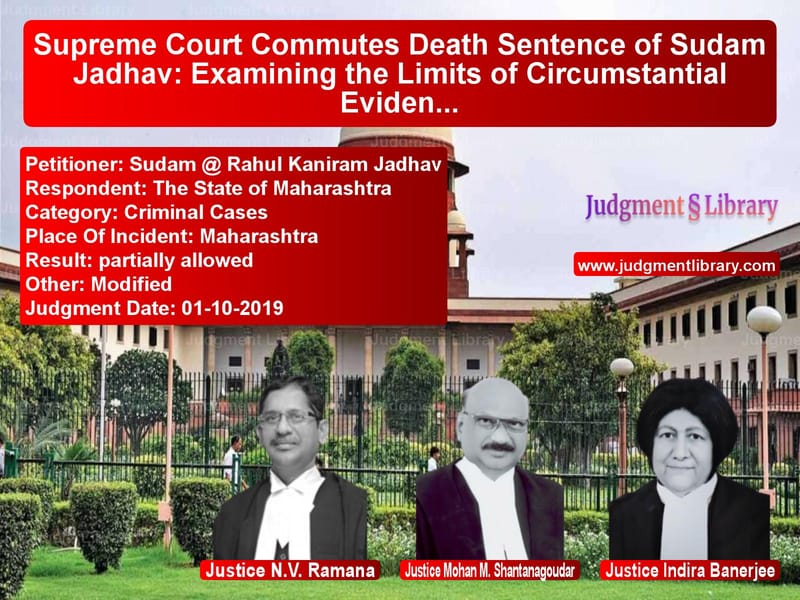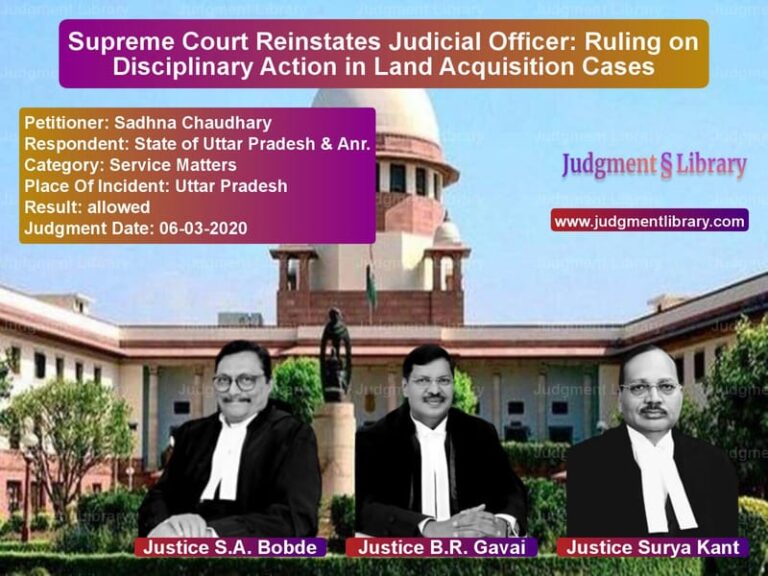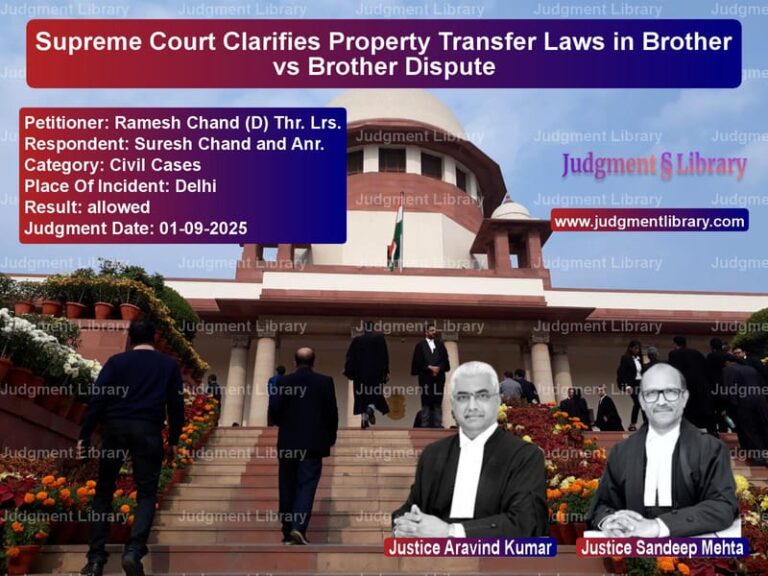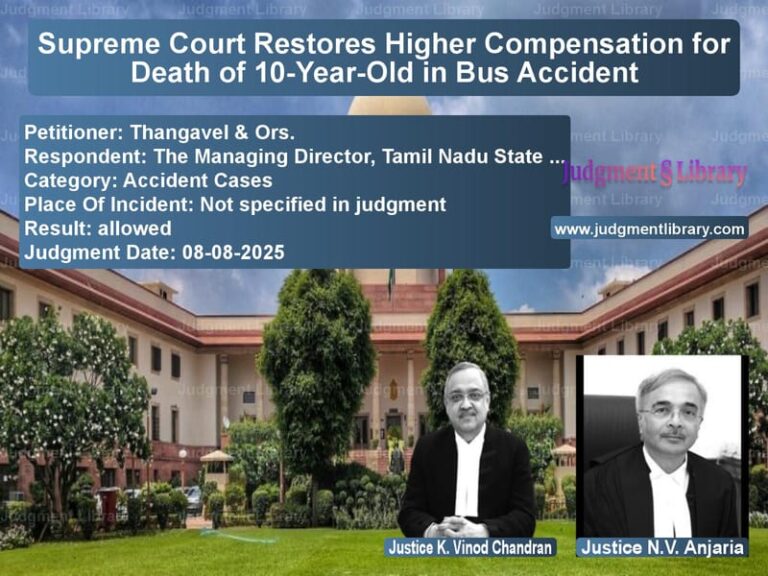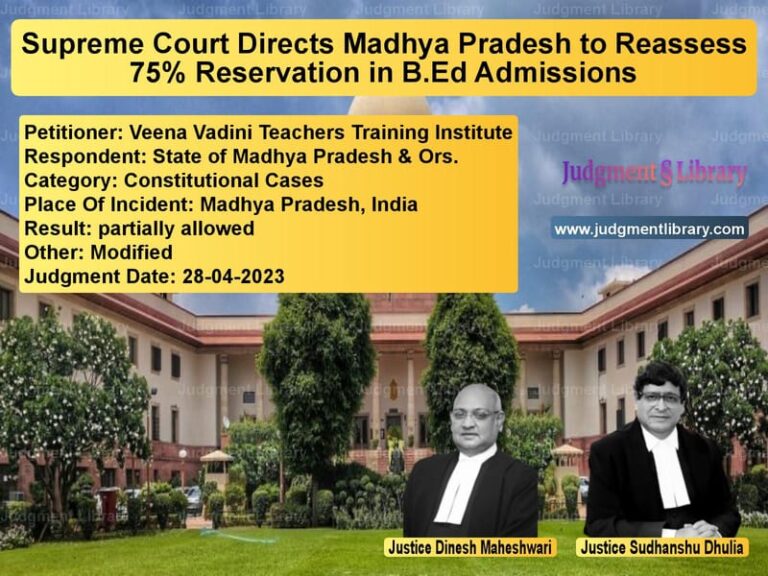Supreme Court Commutes Death Sentence of Sudam Jadhav: Examining the Limits of Circumstantial Evidence
The case of Sudam @ Rahul Kaniram Jadhav v. The State of Maharashtra is a significant ruling on the application of the death penalty in cases based on circumstantial evidence. The Supreme Court, upon reviewing the case, commuted the petitioner’s death sentence to life imprisonment without remission. The judgment reiterates the principle that the death penalty should only be imposed in cases where guilt is established beyond any doubt.
Background of the Case
The case revolves around the gruesome murder of a woman, Anita, and her four children in the village of Rupla Naik Tanda, Maharashtra. Their bodies were discovered on August 21, 2007, floating in a pond. The woman’s body was later found beneath a boulder. The prosecution accused the petitioner, Sudam Jadhav, of strangulating Anita and her children due to disputes over his marital life.
Jadhav was arrested on September 22, 2007, after an alleged attempt to abscond. The trial court convicted him under Sections 302 and 201 of the Indian Penal Code (IPC) and sentenced him to death. The conviction was based on circumstantial evidence, including the ‘last seen’ theory, extra-judicial confessions, and the accused’s alleged motive. The High Court and subsequently the Supreme Court upheld the conviction and sentence.
Petitioner’s Arguments
The petitioner’s counsel, Ms. Nitya Ramakrishnan, raised multiple arguments challenging the conviction and sentence:
- The case was based solely on circumstantial evidence, making the imposition of the death penalty inappropriate.
- There were inconsistencies in the witness testimonies regarding the last-seen theory.
- The Supreme Court erroneously relied on an extra-judicial confession to PW-6, which was later discredited.
- The assumption that the petitioner had crushed Anita’s face to prevent identification was not supported by medical evidence.
- The petitioner’s behavior in jail, though aggressive, did not justify capital punishment.
Respondent’s Arguments
The prosecution, represented by the State of Maharashtra, countered the arguments as follows:
- The petitioner had a clear motive, as he was involved in a dispute with Anita over his relationship with PW-6.
- The petitioner was last seen with the victims before their bodies were discovered.
- The extra-judicial confessions made to PW-6 and PW-9 reinforced his guilt.
- Given the brutality of the crime, the death penalty was justified.
Supreme Court’s Analysis
The Supreme Court, led by Justices N.V. Ramana, Mohan M. Shantanagoudar, and Indira Banerjee, reassessed the case and identified errors in its previous judgment. The key observations were:
“There is no ground for interference with the conviction. However, given the purely circumstantial nature of the evidence, we find that the balance of aggravating and mitigating circumstances tilts in favor of the petitioner regarding the sentence.”
The Court further clarified:
“The reference to the petitioner having crushed the face of the deceased was an error apparent on the face of the record, not supported by medical evidence. Such factual inaccuracies cannot form the basis for imposing the death penalty.”
The Court found that the case relied heavily on circumstantial evidence, which included:
- The petitioner being last seen with the victims (testimony of PW-8).
- Alleged extra-judicial confessions to PW-6 and PW-9.
- The petitioner’s motive, as Anita was allegedly harassing him.
However, it was noted that the extra-judicial confession to PW-6 had been misinterpreted. In cross-examination, PW-6 admitted that the petitioner had not confessed to the murders. The Trial Court had rightly rejected this testimony, yet it was erroneously relied upon in the Supreme Court’s initial ruling.
Review and Reassessment of the Sentence
The Supreme Court reevaluated the evidence and its applicability to the death penalty. The following factors were considered:
- The case was based solely on circumstantial evidence, and no direct forensic evidence linked the petitioner to the crime.
- Errors in fact-finding, such as the incorrect assertion that the petitioner disfigured Anita’s face.
- The doctrine of prudence, as laid out in Bachan Singh v. State of Punjab (1980), which states that the alternative of life imprisonment must be unquestionably foreclosed for the death penalty to be imposed.
- The petitioner’s alleged aggressive behavior in jail, though concerning, did not warrant capital punishment.
Referencing past judgments such as Swamy Shraddhananda v. State of Karnataka (2008) and Ramesh v. State of Rajasthan (2011), the Court noted that capital punishment should be awarded only in cases where there is no room for doubt.
Final Judgment
The Supreme Court ruled:
- The petitioner’s conviction under Sections 302 and 201 IPC was upheld.
- The death sentence was commuted to life imprisonment without remission.
- The petitioner would remain in prison for the rest of his life without the possibility of early release.
Conclusion
This ruling reinforces the Supreme Court’s cautious approach toward the death penalty, ensuring it is reserved for the most extreme cases where guilt is beyond any doubt. The judgment highlights the importance of factual accuracy and the limitations of circumstantial evidence in capital punishment cases.
Petitioner Name: Sudam @ Rahul Kaniram Jadhav.Respondent Name: The State of Maharashtra.Judgment By: Justice N.V. Ramana, Justice Mohan M. Shantanagoudar, Justice Indira Banerjee.Place Of Incident: Maharashtra.Judgment Date: 01-10-2019.
Don’t miss out on the full details! Download the complete judgment in PDF format below and gain valuable insights instantly!
Download Judgment: Sudam @ Rahul Kanira vs The State of Maharas Supreme Court of India Judgment Dated 01-10-2019.pdf
Direct Downlaod Judgment: Direct downlaod this Judgment
See all petitions in Murder Cases
See all petitions in Bail and Anticipatory Bail
See all petitions in Judgment by N.V. Ramana
See all petitions in Judgment by Mohan M. Shantanagoudar
See all petitions in Judgment by Indira Banerjee
See all petitions in partially allowed
See all petitions in Modified
See all petitions in supreme court of India judgments October 2019
See all petitions in 2019 judgments
See all posts in Criminal Cases Category
See all allowed petitions in Criminal Cases Category
See all Dismissed petitions in Criminal Cases Category
See all partially allowed petitions in Criminal Cases Category

